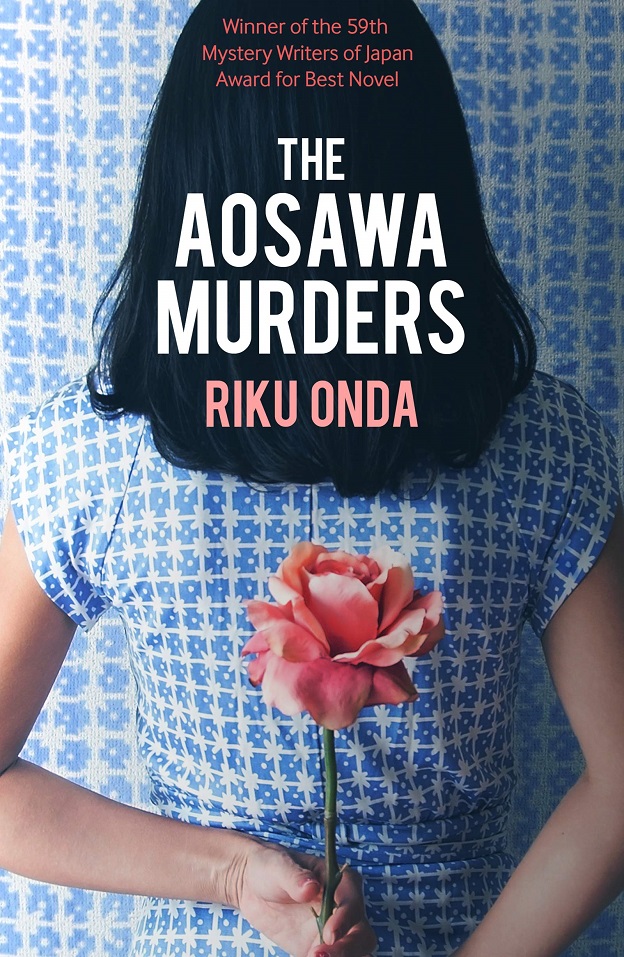17 Jan / The Aosawa Murders by Riku Onda, translated by Alison Watts [in Shelf Awareness]

 What should have been a serendipitous event – a lavish birthday celebration for three generations in 1973 – turns horrific, leaving 17 family and friends dead. Decades after the tragedy, The Aosawa Murders might be a closed case, but award-winning Japanese novelist Riku Onda has plenty more scintillating details to reveal. Onda’s English debut is seamlessly translated by Alison Watts.
What should have been a serendipitous event – a lavish birthday celebration for three generations in 1973 – turns horrific, leaving 17 family and friends dead. Decades after the tragedy, The Aosawa Murders might be a closed case, but award-winning Japanese novelist Riku Onda has plenty more scintillating details to reveal. Onda’s English debut is seamlessly translated by Alison Watts.
In their seaside city of K—, the Aosawas are a prominent family – professionally respected for running the town’s medical clinic and personally admired because of their longstanding wealth and privilege. On that fateful birthday, a commemorative gift delivery of sake and spirits ushers in violent deaths, leaving a single Aosawa survivor. The only daughter, Hisako, was in the midst of it all, but being blind prevented her from definitively identifying any suspects. The perpetrator – although seemingly unknown and unconnected to the Aosawas – allegedly confesses before hanging himself, but his suicide never quite absolves lovely, untouchable Hisako of being somehow involved.
Eleven years later, Makiko Saiga, who was a neighborhood child when the murders occurred, publishes The Forgotten Festival. Despite its ironic title, the fictionalized adaptation – composed from extensive research on-site and delicate interviews about that grievous time – began as Makiko’s university thesis and morphs into a runaway bestseller. Despite the furor the book provokes, Makiko never writes again. Two additional decades pass and, suddenly, an unnamed interviewer has started asking questions. Even after all this time, those directly – but also remotely – involved have memories to resurrect, theories to ponder, maybe even a few secrets to divulge finally.
In Rashomon-esque style, Onda judiciously presents multiple viewpoints: a transcript of a police interview with survivor Hisako; seemingly casual conversations with Makiko, her research assistant and her estranged brother; an excerpt from Makiko’s too-true novel; and dialogues with the daughter of the Aosawas’ late housekeeper, who was serving at the fateful fête, and the now-retired detective who substituted his chain-smoking with folding origami cranes. With sophisticated precision, Onda meticulously imparts both whodunnit and whydunnit clues throughout, adroitly manipulating readers in a cat-and-mouse game of discovering what really happened.
Originally published in 2005 as Eugenia, Aosawa is Onda’s debut crime novel, for which she earned the Mystery Writers of Japan Award for Fiction in 2006. As Onda joins fellow internationally acclaimed Japanese crime novelists-in-translation – like prodigious Keigo Higashino (Under the Midnight Sun), disturbing Natsuo Kirino (Real World) and riveting Kanae Minato (Penance) – the imminent success of The Aosawa Murders should inspire Stateside demand for more Onda titles.
Shelf Talker: Three decades after the gruesome murder of 17 birthday party guests, unanswered questions inspire a Rashomon-esque reveal in Riku Onda’s The Aosawa Murders.
Review: Shelf Awareness Pro, January 16, 2020
Readers: Adult
Published: 2005 (Japan), 2020 (United States)
